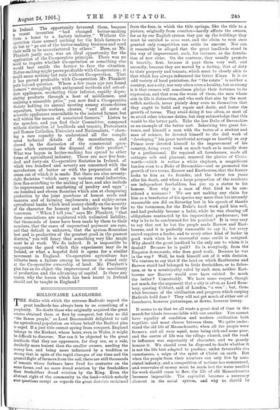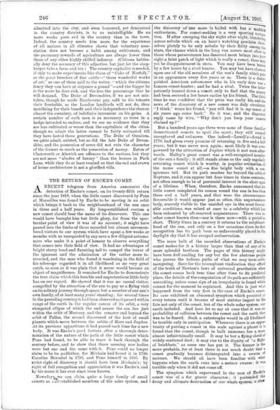MILLIONAIRE LANDLORDS.
THE dislike with which the extreme Radicals regard the great landlords has always been to us something of a perplexity. No doubt those who originally acquired the great estates obtained them at first by conquest, but then so did. the Saxon people," as Lord Beaconsfield delighted to call the agricultural population on whose behalf the Radical plea is urged. If a just title cannot spring from conquest, England belongs to the Euskari, whose heirs, even in Wales, it might' be difficult to discover. Nor can it be objected to the great landlords that they are oppressors, for they are, as a rule, decidedly more lenient than the smaller owners, needing the money less, and being more influenced by a tradition so strong that, in spite of the rapid changes of our time and the general flight of farmers from the soil, there are still thousands of tenants whose forbears have lived for centuries on the same farms, and no more dread eviction by the freeholders than freeholders dread eviction by the King. Even the abstract right of the community to the land—which nobody ever questions except as regards the great districts reclaimed from the fens, in which the title springs, like the title to a picture, originally from creation—hardly affects the owners, for as by our English system they put up the buildings they must be entitled to some rent, and the claim to rent once granted only competition can settle its amount. Nor can it reasonably be alleged that the great landlords stand in the way of improvement, such, for instance, as the founda- tion of new cities. On the contrary, they usually prorttote it heartily, first, because it pays them very well, and secondly, because they are moved by a feeling, that of duty to their property and tenants, which must be closely akin to that which has always influenced the better Kings. It is an odd variety of local patriotism, for " the estate " is neither a country, nor a city, nor very often even a locality, but so strong is it that owners will sometimes pledge their fortunes to its expression, and that even the worst of them, the men whose aim in life is distraction, and who seek that aim by the most selfish methods, never plainly deny even to themselves that they ought to build and repair and drain, and foster the growth of towns. They avoid doing it too often, as most of us avoid other irksome duties, but they acknowledge that this would be the better path. Take the late Duke of Devonshire as an example of the better sort. Inheriting two grea- t for- tunes, and himself a man with the tastes of a student and man of science, he devoted himself to the dull work of " developing " his great territorial acreage as heartily as any Prince ever devoted himself to the improvement of ' his country, doing every week as much work as is usually done by a professional. He repaired all farmhouses, made all cottages safe and pleasant, renewed the glories of Chats- worth—which is rather a white elephant, a magnificent burden even to a Duke of Devonshire—and so promoted the growth of two towns, Barrow and Eastbourne, that the former looks to him as its founder, and the latter ten years after his death, and when a large proportion of 'the:residents are independent freeholders, has put up a statue to bis honour. Now why is a man of that kind to be con- sidered a nuisance ? We' are not making any claim for him as a benefactor of his species any more than his intensely reasonable son did on Saturday last in his speech of thanks to the townsmen, for the Duke's hard work paid him well, and had probably become a habit, while he was clearing off obligations 'contracted by his improvident predecessor; but why is he to be condemned for his position? It is very easy to say that not he but the people made Barrow and East- bourne, and it is perfectly reasonable to say it ; but every crowd requires a leader, and to' every other kind of leader in good work when he is successful some credit is assigned.
• Why should the great landlord be the only one to who'm it is denied? Because he is paid? So is everybody, from the Emperor downwards, who does good work. Because he was in the way ? Well, he took himself out of it with decision. We venture to say that if the land on which Eastbourne and Barrow stand had belonged to little freeholders, or to fisher- men, or to a municipality ruled by such men, neither East- bourne nor Barrow would ever have existed. So much the better ? Conceivably. We have some respect, though not much, for the argument that a city is often, as Lord Rose- berg, quoting Cobbett, said of London, " a wen" ; but, then, what becomes of the civilisation and progress which carping Radicals hold dear ? They will not get much of either out of foreshores, however picturesque, or downs, however breezy.
It seems to us that we all waste a great deal of time in the search for ideals irreconcilable with one another. You cannot have equality of condition and modern civilisation both together, and must choose between them. We quite under.- stand the old life of Massachusetts, when all the people were farmers, and all were equal, none being rich and none poor, and the centre of life was the village church, and the road to influence was superiority of character, and we greatly honour it. We should even be disposed to doubt whether it is not the life best adapted to produce, under' favourable cit.. cumstances, a reign of the spirit of Christ on earth. Bat when the people from their numbers can only live by asso- ciated industry, and a competition of nations has commenced. and reservoirs of money must be made lest the water needful for work should cease to flow, the life of old Massachusetts becomes impossible. The capitalist becomes a necessary element in the social system, and why he sheuld be idmitted into the city, and even honorired, yet denouiaced in the country districts, is to us unintelligible. He no more works pure evil in the country than in the town. Indeed, the country needs him more, for the experience of all nations in all climates shows that voluntary asso- ciation does not become a habit among cultivators, and the pecuniary rewards of agriculture are always lower than those of any other highly skilled industry. (Citizens habitu- ally deny the accuracy of this adjective, but just let the shop- keeper take a farm and try.) The country capitalist is needed, if only to make experiments like those of " Coke of Norfolk," or the great breeders of fine cattle—" those wonderful works of art," as one of them said to the writer, "which the citizens fancy they can have at sixpence a Pound "—and the bigger he is the more he dare risk, and the less the percentage that he will demand. The Duke of Devonshire, if we are not mis- taken, though he made 'Eastbourne pay, sold* to his tenants their freeholds, as the London landlords will not do, thus Sacrificing for their benefit and their independence the chance, almost the certainty, of indefinite increment on his gains. A certain number of such men is as necessary as trees in a hedge intended to endure, and we see no evidence that they Are less-cultivated or worse than the capitalists of the cities, though we admit the latter cannot be fairly estimated till they have lasted three generations. The Duke of Omnium, we qnite admit, existed, but so did the late Duke of Devon- shire, and the possession of acres did not ruin the character of the'former so much as the possession of money. Eaton or Chatsworth or Alnwick are offences to the envious, but they are not more " abodes of luxury " than the houses in Park Lane, while they do at least remind us that the end and crown of house architecture is not a glorified villa.



































 Previous page
Previous page